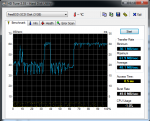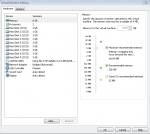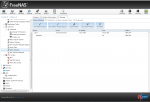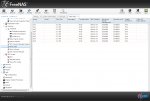Hi,
This is my first attempt to check FreeNAS+ZFS+iSCSI.
Everything was performed in VMWare Workstation. FreeNAS was configured as it follows:
2 cores of 3770K
8GB RAM out of 32GB
8x 3GB virtual disks stored on a Samsung 840 PRO 512GB SSD (500mb/s+ write/read)
I've created a 3GB zvol(if I remember correctly, this was the maximum possible?!) on a RAIDZ2 ZFS Volume.
iSCSI was configured according to the following guide:
View: http://www.youtube.com/watch?v=7jn2q2ysr5g
The transfer speeds were not astonishing ranging from 7mb/s to ~60mb/s, but it felt quite snappy when trying to display thumbnails of photos, probably due to the low access time of the SSD.
I have some questions:
-where do i see how much space do I have left for adding new zvols?
-how do I see if everything has been written to the array? (when transferring via iSCSI)
-where do I see if everything is ok with my volume?
-where are the checksum settings?(where can I read more about them)
-how do I see the volume type raidz2 z1, etc?
-how much space does ZFS take on a 8 HDD raidz2 config, on each hdd?
(I could not create a new volume/zvol on my 8x3GB configuration, due to lack of space, where's the remaining space?)
This is my first attempt to check FreeNAS+ZFS+iSCSI.
Everything was performed in VMWare Workstation. FreeNAS was configured as it follows:
2 cores of 3770K
8GB RAM out of 32GB
8x 3GB virtual disks stored on a Samsung 840 PRO 512GB SSD (500mb/s+ write/read)
I've created a 3GB zvol(if I remember correctly, this was the maximum possible?!) on a RAIDZ2 ZFS Volume.
iSCSI was configured according to the following guide:
View: http://www.youtube.com/watch?v=7jn2q2ysr5g
The transfer speeds were not astonishing ranging from 7mb/s to ~60mb/s, but it felt quite snappy when trying to display thumbnails of photos, probably due to the low access time of the SSD.
I have some questions:
-where do i see how much space do I have left for adding new zvols?
-how do I see if everything has been written to the array? (when transferring via iSCSI)
-where do I see if everything is ok with my volume?
-where are the checksum settings?(where can I read more about them)
-how do I see the volume type raidz2 z1, etc?
-how much space does ZFS take on a 8 HDD raidz2 config, on each hdd?
(I could not create a new volume/zvol on my 8x3GB configuration, due to lack of space, where's the remaining space?)




